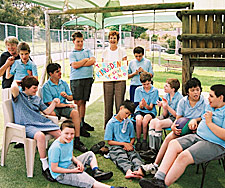
Federal politicians described her as a "hero' for fighting to save Kingsdene Special School from closure last year.
But principal Gloria Boyd, a 24-year veteran of working with children with disabilities, says the parents of her charges are the real champions, and they need more help.
Ms Boyd paid tribute to their efforts as Anglicare announced its drive to raise $170,000 this year to add necessary services to Sydney’s only five-day residential for children with disabilities.
Last year's long fight to save Kingsdene threw light on the case of a Sydney mother, Daniela Dawes, charged with murdering her severely autistic son, Jason, and then attempting her own suicide.
This brought media attention to the gaping holes in support services for parents of children with disabilities.
The Institute of Health and Welfare records that there are 144,300 Australian children with a severe disability, the vast majority of whom are cared for at home by their mothers.
That means that tens of thousands of women are like Daniela, virtually trapped in their own homes as they help their children dress, eat, toilet and live.
Facing closure in 2004, the school community, led by parents, staff and friends, fought to secure the funding needed to supplement Anglicare’s contribution to operating costs and continue caring for the children and providing families with the respite they need to cope.
Together with State and Federal Governments, over half a million dollars was raised.
The overwhelming response not only saved the school, but also maintained the resources required to provide children with access to music therapy classes, bus access to the community, teacher’s aides support and heating of the hydrotherapy pool area.
This year, the school hopes to expand the Sensory Program through the building of a sensory room and garden.
“We are already seeing the benefits of some sensory activities introduced at Kingsdene. Teachers overwhelmingly report that the students’ behavioural patterns are calmer and that there is increased participation in school activities,” Ms Boyd says.
Alarmingly, Kingsdene is the only facility of its type in Sydney - providing residential schooling to just 23 children with moderate to severe physical, intellectual and emotional disabilities.
Ms Boyd says the level of passion around last year’s appeal for funds was indicative of the vital role Kingsdene plays.
“We might only have 23 students at Kingsdene, but that’s 23 families who rely on us to give their children the support, stimulation and “living skills” they can’t provide at home.
“It’s never an issue of a lack of love - in fact, often it’s quite the opposite. It’s about facilities, trained personnel and an environment wholly and solely geared to their special needs,” Boyd said.
“And it’s about support for parents and siblings. Without it, parents are on duty 24 /7. Families of Kingsdene children look forward to the weekends and their time together.”
The absence of more current prevalence data in this area is an indication of how, as a society, we can overlook our most needy citizens.
However, in line with the international trend, the Australian Bureau of Statistics will ask all Australians to answer questions relating to disability in their household as part of the 2006 census.
Its inclusion alone acknowledges that disability as an issue of national importance.
Boyd, a recognised leader in her field, welcomes the prospect of more accurate data.
“Perhaps when more than just a few of us have an understanding of the real need in the community for services such as ours, we won’t have to fight for our survival year after year and the Kingsdene model might be recognised as a valuable option to support families,” she says.
“What families need is choice. They need to be able to decide what support is best for their child and the rest of the family, and to have access to that support.
“Because we are only one small school, we have enquiries from many families who have chosen the services we provide but not all are able to access them.
“If you can’t get what you need, then you don’t really have a choice.”























